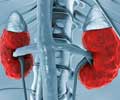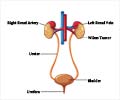Aggressive, personalized treatment increases kidney cancer patient survival, according to a landmark study by researchers at University of California, Los Angeles.
Aggressive, personalized treatment increases kidney cancer patient survival, according to a landmark study by researchers at University of California, Los Angeles.
The study of nearly 1,500 patients treated for kidney cancer at UCLA in the last 15 years shows that an aggressive, tailored treatment approach results in better survival rates and uncovered subsets of kidney cancer that behave differently and need to be treated accordingly.The one-size-fits-all approach traditionally used in kidney cancer treatment should be changed based on the results of the study, the longest to date to analyze kidney cancer patients and their outcomes, said Dr. Arie Belldegrun, senior author of the study, a professor of urology and a researcher at UCLA's Jonsson Comprehensive Cancer Center.
"This is the most important work that we've done out of the kidney cancer program at UCLA," Belldegrun said.
"We outline the foundation for personalized kidney cancer therapy. We have shown that not all kidney cancer patients are the same, not all localized kidney cancers are the same and not all metastatic kidney cancers are the same," the expert added.
The study has been published in the Nov. 1, 2008 issue of Cancer, the peer-reviewed journal of the American Cancer Society.
The study found that patients with localized kidney cancer, cancer that has not spread to other organs, could have either low, intermediate or high risk cancers based on the chance for recurrence. Patients with cancers that have already spread also fell into similarly different subsets. Some have better outcomes while others may have very aggressive cancers that may not warrant treatment.
"Now we can make treatment decisions based on that," the expert added.
"All of these patients with cancers that have not spread present to their doctors with presumably localized disease and in the past they may have been treated the same way. They need to be treated individually according to their risk levels," Belldegrun said.
The study showed that a patient with low-risk, localized kidney cancer could be treated only with surgery and expect an excellent outcome. Such a move would spare the patient from having to undergo radiation or immunotherapy, which result in harsh side effects. However, for a patient with high-risk, localized kidney cancer, surgery would not be enough.
Source-ANI
SRM/SK
 MEDINDIA
MEDINDIA




 Email
Email










